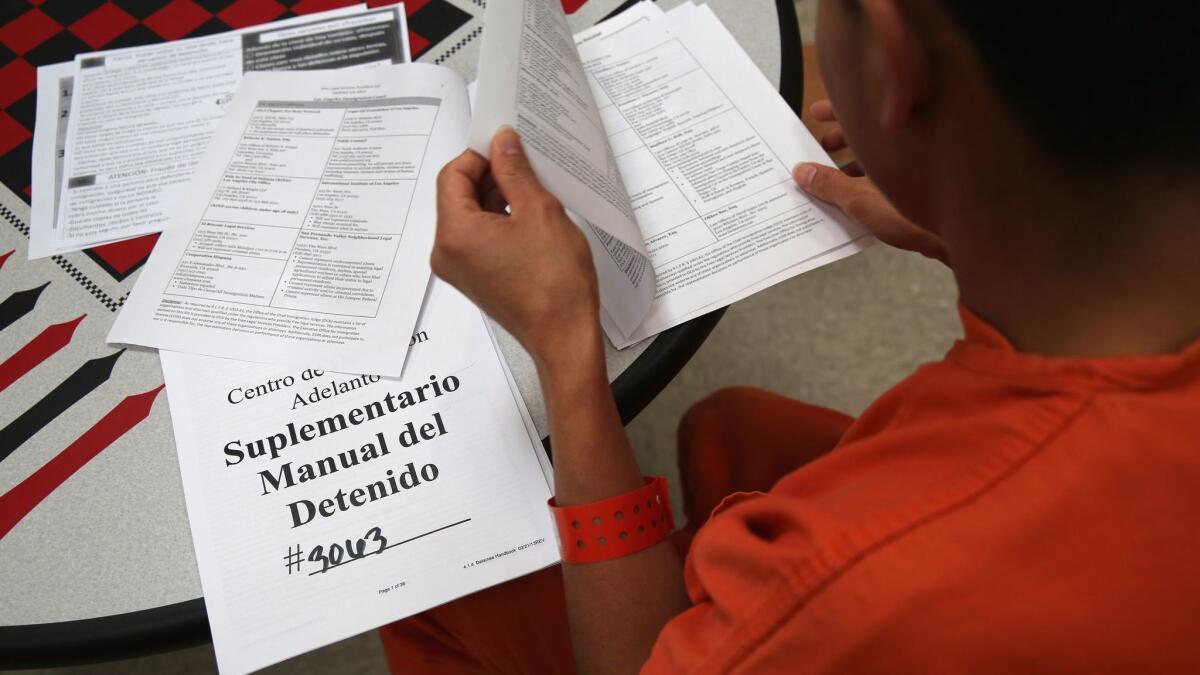Immigration detainees should be held in for-profit prisons, panel says

Immigration authorities should continue holding people accused of immigration violations in for-profit prisons despite complaints about safety and other problems, a Department of Homeland Security review panel has concluded after examining the issue.
Privately run detention facilities have long attracted criticism from immigration advocates and human rights groups for poor conditions and inadequate medical care.
But in a 23-page report released Thursday, the panel said eliminating them would cost too much and make it harder for U.S. Immigration and Customs Enforcement officers to cope with sudden surges in the detainee population.
“Use of these facilities will continue,” Karen Tandy, who led the panel that conducted the two month review, told the Homeland Security Advisory Council. “We’ve seen dramatic surges in detention.”
Using a mix of private and public facilities to house detainees now costs $3 billion a year. Using only government-run prisons would cost up to $6 billion, the panel found.
But Marshall Fitz, a senior fellow at the left-leaning Center for American Progress who helped draft the report, wrote a dissent saying evidence “points directly toward the inferiority of the private prison model.”
“This is a premature conclusion,” Fitz said of the panel’s endorsement of private prisons. “I couldn’t in good conscience sign on to that.”
The report passed the advisory council, although 17 of the 23 members signed on to Fitz’s dissent. Only five voted to pass the report as written. One voted against approval.
The debate played out in front of Secretary of Homeland Security Jeh Johnson, who attended the meeting and said he would read the report.
In a statement, ICE spokeswoman Danielle Bennett said the agency “will review and consider the council’s recommendations and will implement any changes, as appropriate.”
The report is good news for the firms that now operate immigration detention centers, which have seen their business prospects brighten as investors count on a steady flow of new detainees.
The stock price for CoreCivic, the new name for the Corrections Corp. of America, the largest private prison company in the world, has increased 67% since last month’s election.
The value of GEO Group stock, another private prison company with immigration detention centers, has risen 40%.
Both companies saw their stocks tank in August after the Department of Justice announced plans to phase out its use of private prisons.
Ratings agency Moody’s downgraded the credit ratings of both companies, reflecting “substantial uncertainty” around the industry.
Though both companies have contracts with other government entities — including cities and states — the federal government, and ICE in particular, is their biggest customer. Contracts with ICE accounted for 24% of CoreCivic’s revenue last year and nearly 18% of GEO Group’s.
In a statement, GEO spokesman Pablo Paez said the review “confirms our long history of providing culturally responsive, safe and humane environments that meet the non-penal needs of those individuals entrusted to the care of ICE.”
Jonathan Burns, a spokesman for CoreCivic, said the company provides “a safe, humane and appropriate environment for those entrusted to our care.”
But the report was a stinging disappointment for civil rights and immigrant advocacy organizations that were hoping Homeland Security would end contracts with private detention facilities.
They say the facilities are likely to only get more crowded once President-elect Donald Trump takes office. Trump has vowed a vastly harsher regime of immigration enforcement.
“The big business of incarceration will only intensify under the president-elect’s anticipated deportation regime,” Mary Small, policy director of the Detention Watch Network, said in a statement.
Advocates say the government should expand supervised release and other alternatives to detention.
“It clearly shows they acknowledge a lot of the problems, yet their recommendation is to give ICE more funding,” Jacinta Gonzalez, an immigration advocate at the Not One More campaign, said of the report.
In August, Johnson asked the panel to examine the effect of stopping use of private facilities to detain immigrants facing deportation.
The request followed a Federal Bureau of Prisons decision to stop using private prisons after reports of abuses. A deputy attorney general said in a memo that they were not as good as federal facilities and not substantially cheaper.
But the Homeland Security advisory report argued that it’s easier to phase out private detention beds for criminals than for immigrants.
While only 15% of the Bureau of Prison inmates are held in privately run prisons, the industry handles 65% of immigration detainees, the report says.
Only 10% are in government-run facilities. The rest are in cells rented from state or local jails.
The report says those jails, which also may hold suspects who have committed violent crimes, are not appropriate for immigration violations and that those contracts should be phased out.
A recent surge of illegal immigration has meant record numbers of people in custody — from a normal range of 31,000 to 34,000 people to 41,000 now.
Johnson has said the department needs more beds to cope with the increase.
The report said ICE could improve conditions by better monitoring, including more unannounced inspections and placing a high-ranking ICE official as a sort of warden in each center.
The agency also could improve procedures for tracking complaints and improving healthcare by putting more funds into the Health Services Corp., ICE’s own medical bureau, the report said.
Twitter: @ByBrianBennett
Times staff writer James Rufus Koren contributed to this report.
ALSO
When Trump says he wants to deport criminals, he means something starkly different than Obama
Yes, Trump can boost deportations and gut the Dreamer program for young immigrants
An outsider takes charge of the Border Patrol — and yes, he’ll wear the green uniform
More to Read
Start your day right
Sign up for Essential California for news, features and recommendations from the L.A. Times and beyond in your inbox six days a week.
You may occasionally receive promotional content from the Los Angeles Times.








